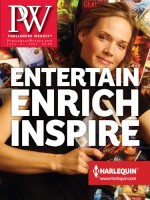A symposium held in early March at Boston's Emerson College entitled "Business Models for 21st-Century Literary Publishing" attracted the cream of New England's creative economy, including editors, writers, and publishers. Conference chair Scott Walker, of Orion Magazine, invited me to open the day with an overview of the challenges and opportunities facing the industry, with a specific request to see things not as a glass half-empty, but as a glass half-full. Walker had asked an Irishman to be optimistic. That's like asking a car salesman to be honest. In other words, I really had to work at it.
Yet Walker's direction to look to the light is an imperative worth exulting. In 2011, there is an overwhelming tendency to go dark where the business of any media is concerned, literary or otherwise. But the moral choice for any creative endeavor, I believe, is to affirm the value of life and work, and to offer hope. Of course, affirmation and hope mean little if they are only crepe paper substitutes for steely reality.
In Eleanor Porter's 1913 classic, Pollyanna, a young orphan goes to live with her hard-nosed Aunt Polly, a woman who would never be accused of spoiling a child. No matter the circumstance, Pollyanna always tries to find something to be glad about—what she calls "the glad game." When she is shut away in a dreary attic room, for example, Pollyanna exalts at the beautiful view out of the window.
I do not want to be a Pollyanna. And what no one in the publishing business in 2011 needs is to play "the glad game." As I spoke on the Emerson College campus overlooking Boston Common (with a beautiful view), I knew the Borders bookstore down Boylston Street was preparing to close. I knew, too, that the most common price paid for an e-book on Amazon is zero.
But I also know that, while we have been a people of books for more than 500 years, the book business required time to make us customers, not only readers. In his much praised historical work, The Book in the Renaissance, Andrew Pettegree rewinds the clock to 1450, when Gutenberg invented movable type and the printing press, and he follows the story meticulously for more than a century and a half. Gutenberg, the inventor of the printing press, did not invent the publishing business, Pettegree shows. Indeed, Gutenberg died in bankruptcy. It was not until the very beginning of the 17th century that book publishing became anything like the business we know today.
Meanwhile, just across the Charles River, not far from where I spoke, the forerunner of the Internet, ARPANET, was born in 1969 at Bolt, Beranek and Newman, the technology R&D firm. There, in 1971, engineer Ray Tomlinson sent the world's first e-mail, from one dummy computer terminal to another sitting just beside it. His message, "QWERTYUIOP" was the first line of the keyboard. I find that to be a rather telling point: digital doesn't care about content. The digital age was begun with a baby's gibberish. And despite centuries of publishing history, authors are now in the cradle of the digital age.
What, then, is to be done? As Walker asked of me, try to be optimistic. Nobody knows where the digital age will lead us. But focusing on what digital can offer authors, publishers, and readers only illuminates the nature of future audiences. And because of mobile technology, those audiences are now global. It may be your book, but it is now on their phones.
Be social. Writers are notoriously antisocial, but with digital tools like Twitter and Facebook, even antisocial people can be social without ever leaving the house. Facebook can get you fired, a marketing guru once told me, but it can also find you customers.
Be mobile. My daughter begins college this fall, and she is already asking about an iPad. She's not interested in a backpack for all of her books. My mother recently turned 78, and she's asking me about "cloud computing."
As I prepared to address the symposium that March day, I turned to Albert Einstein, a theoretical physicist with an artist's intuition, for some perspective. "Imagination," Einstein once observed, "is more important than knowledge."
Christopher Kenneally is author of Massachusetts 101 (Applewood) and director, author relations, for the Copyright Clearance Center, where he hosts CCC's podcast series, Beyond the Book.



 Volume 258
Issue 23
06/06/2011
Volume 258
Issue 23
06/06/2011





